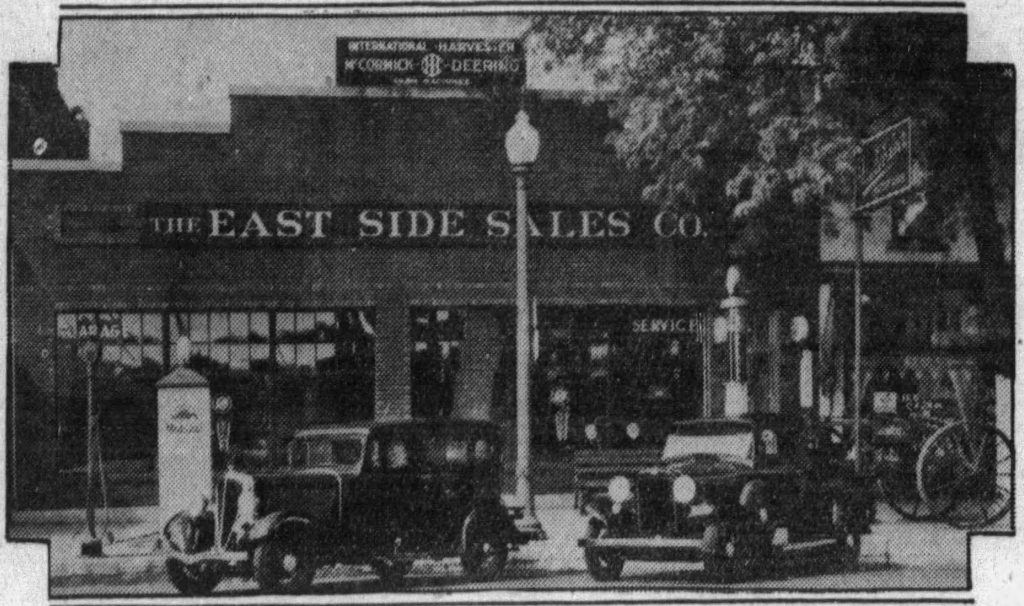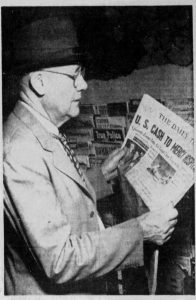Ever wish you had a time machine so you could travel back in time to see what your ancestors’ lives were like? While we can’t give you a time machine, we can give you what may be the next best thing: the ability to visit your ancestors’ hometown without leaving your couch. How can you do this? With newspapers!
If you’ve already searched for your ancestors’ names in the papers, fleshing out what their lives may have been like is the next step in discovering their story. And since the place a person lived often had a big impact on what their daily life was like, it’s worth putting in some time to learn about it.
This is where newspapers come in, because they are a nearly bottomless resource for finding out what life was like in the towns and cities they served. The added benefit to this approach is that even if you can’t find your ancestors mentioned by name in a newspaper, you can still use the paper to help you piece together the details of their lives.
For your journey, we’ve put together a “tour guide” of sorts to help you use newspapers to explore your ancestors’ hometown and learn more about their lives in the process. Check it out!

HOMETOWN TOUR GUIDE
Step 1: Find your paper
In many cases, Newspapers.com will have a newspaper (or more than one!) from the town or city your ancestors lived in. But if we don’t, here are some tips for locating other papers that may be useful in your research.
- Use the Newspapers Map on our site to find the paper closest to the town or city where your ancestors lived. Zoom in on a specific geographical region to find out which papers were being published in the area. Adjust the date slider to see papers from a particular time frame (such as the years your ancestor lived there).
- Find out which county your ancestors’ hometown is in, and then look for a paper from the county seat. Newspapers from the county seat often contain news from surrounding towns. You can see which papers from a particular county are on Newspapers.com by using the advanced search. Just enter the county name into the Place/Paper Location field, and hit the search button.
- Look at papers from similar-sized towns or cities in the same part of the state. While each community has its differences, life was probably fairly similar in towns of the same size from the same region.
- Use the date and location filters on the Papers page to find papers in the state your ancestors lived in that were published while they lived there.
Step 2: Find representative issues of the paper
Once you’ve found the newspaper you want to use, pick some issues of the paper to look at. We recommend you pick a few issues from a variety of years in your ancestor’s life. (You could even pick significant dates in their lives, such as the day they were born, started school, got married, passed away, and so on.) The more issues you look at, the more detailed your understanding of the town will be. But if you feel overwhelmed, start by looking at just one!

Step 3: Browse the paper
You might be surprised at how much you can learn about a town from seemingly unimportant newspaper sections. We’ve come up with 15 parts of the newspaper we suggest you look through, but the possibilities are nearly endless. We’ve also included some questions to ask yourself to help guide your journey.
- Ads/classifieds – What businesses were in town? Where did people shop? What products were available? How much did things cost? What services were individuals offering? What types of jobs were being advertised?
- Train & ship ads/schedules – Which places could people from the town or city easily travel to? Was their hometown a travel hub? (If it was, this probably meant increased exposure and access to outside fashions, trends, lifestyles, etc.)
- Weather reports – What was each of the four seasons like? If it was a farming area, did it receive enough rain for a good harvest? Were there any big weather events (blizzards, tornadoes, hurricanes, etc.) that would’ve affected the townspeople’s lives?
- Photos – What were people wearing? What were the hairstyles? What did the town itself look like (buildings, scenery, etc.)?
- Local news – Was there anything noteworthy going on? Was there any breaking news that would’ve been the talk of the town?
- Party/reunion/event descriptions – What types of activities were planned? What games did they play? What food was served? What kinds of people were invited?
- Entertainment sections – What entertainment options were available? Was there a theater or cinema? If so, what plays or movies were out? Was the local sports team doing well? Does it seem like a lot of people attended local sports matches?
- Crime reports/police blotters – Did the town or city seem safe? What kind of crime was happening?
- Holiday celebration descriptions – Were there any big holiday celebrations that happened in town every year? How did individual families celebrate holidays on a smaller scale? (Descriptions of private celebrations may alert you to common local traditions.)
- Vacation/travel notices – Are there any places people from the town commonly traveled to? If it’s a small town, which bigger city did most people visit for shopping, entertainment, etc.?
- Obituaries/death notices – What illnesses were common in the area? Did a lot of people die of the same illness around the same time? (If so, this may indicate there was an epidemic.)
- Local election/political news – What were the big political issues in the area? What local laws and ordinances were being passed or repealed?
- Letters to the editor/op-eds/editorials – What were some of the opinions in town? What issues did people seem divided on and on which did most people seem to agree?
- Recipes & grocery store ads – What ingredients and food items were available? Which foods seem common and which seem like items for special occasions? Do some ingredients seem preferred over others?
- Articles with addresses – Are there any mentions of the neighborhood your ancestors lived in? What about the street they lived on? (Or even their specific house?) Who else lived in the area? Do there seem to be a lot of people in the neighborhood from the same family? Or immigrants from the same country? What were the neighbors up to? What was going on in the neighborhood?

What do you think? Did we miss any newspaper sections that may be helpful? Let us know in the comments! And happy travels on your hometown newspaper tour!
Follow us on Facebook, Twitter, and Instagram for helpful tips and interesting historical content!


Please cancel my subscription dunbarjane1965@gmail.com
Please cancel my subscription dunbarjane1965@gmail.com